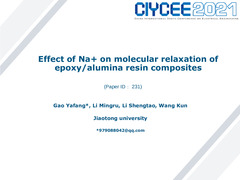Effect of Na+ on molecular relaxation of epoxy/alumina resin composites
ID:192
Submission ID:231 View Protection:ATTENDEE
Updated Time:2021-12-03 10:46:23 Hits:819
Oral Presentation

Start Time:2021-12-16 09:45 (Asia/Shanghai)
Duration:15min
Session:[D] High voltage and insulation technology » [D3] Session 16
Video
No Permission
Presentation File
Tips: The file permissions under this presentation are only for participants. You have not logged in yet and cannot view it temporarily.
Abstract
Abstract – Epoxy resin is an insulating material widely used in high-voltage electrical equipment, and Na+ is one of the main impurity ions in epoxy resin. In this research, we added different mass fraction Na+ into epoxy/alumina composites. After that, we measured the gel time, glass transition temperature and broadband dielectric spectrum. Besides, we used H-N function to fit the data of dielectric spectrum,used VFT function to calculate the activation energy of macromolecular chains. The gel time data showed that Na+ can promote the gelation of epoxy composite castables. The glass transition temperature proved that Na+ can promote crosslinking. The calculation results of dielectric fitting showed that Na+ can increase the activation energy of macromolecular chains and increases the intensity of ion ionization. This research reveal the effect of Na+ on molecular relaxation in epoxy composites and provide reference for the control of Na+ content in epoxy composites.
This work was supported by Science and Technology Project of SGCC Project Numbers (5500-201958322A-0-0-00)
Yafang Gao, State Key Laboratory of Electrical Insulation and Power Equipment, Xi`an Jiaotong University Xi`an, China. (Email: 979088042@qq.com)
Mingru Li, State Key Laboratory of Electrical Insulation and Power Equipment, Xi`an Jiaotong University Xi`an, China. (Email: 549675145@qq.com)
Shengtao Li*, State Key Laboratory of Electrical Insulation and Power Equipment, Xi`an Jiaotong University Xi`an, China. (Email:sli@mail.xjtu.edu.cn)
Kun Wang,State Key Laboratory of Advanced Power Transmission Technology Global Energy Interconnection Research Institute Co., Ltd Beijing, China wangkun278@163.com
Yafang Gao, State Key Laboratory of Electrical Insulation and Power Equipment, Xi`an Jiaotong University Xi`an, China. (Email: 979088042@qq.com)
Mingru Li, State Key Laboratory of Electrical Insulation and Power Equipment, Xi`an Jiaotong University Xi`an, China. (Email: 549675145@qq.com)
Shengtao Li*, State Key Laboratory of Electrical Insulation and Power Equipment, Xi`an Jiaotong University Xi`an, China. (Email:sli@mail.xjtu.edu.cn)
Kun Wang,State Key Laboratory of Advanced Power Transmission Technology Global Energy Interconnection Research Institute Co., Ltd Beijing, China wangkun278@163.com
Keywords
composite insulation materials; dielectric properties; epoxy resin; impurity ions; Molecular chain
Speaker




Comment submit